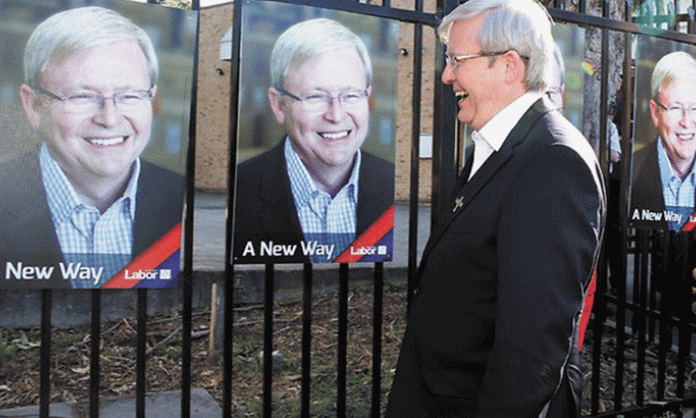When the USSR collapsed more than 20 years ago, right wing academic Francis Fukuyama wrote a notorious article announcing “the end of history”. What he meant was that all the great ideological battles of human history had been settled, free market capitalism had triumphed, and there was nothing of any significance remaining to be fought over.
9/11, the “war on terror”, the economic crisis that began in 2007: all of these gave those of us on the left plenty of opportunities to mock Fukuyama’s predictions of a utopian capitalist future. He became the go-to right wing crank whenever the left wanted to take a cheap shot.
But there is somewhere that Fukuyama’s “end of history” world lives on – if a strangely deformed and dystopic version of it. That place is the bubble otherwise known as the Australian political establishment.
For our major political parties and their bloated band of media commentators, spin doctors and political advisers, history has indeed ended. Politics is no longer about the clash of ideologies (or, heaven forbid, classes). The political battles of the past are distant memories, long ago replaced with personality contests and disputes about whether we need “a new way” or merely to be “fair dinkum”.
On all the issues of substance, there is a stultifying consensus. Liberal and Labor agree about almost everything that matters: the superiority of free market economics; the necessity of ensuring business “confidence” and profitability at all costs; the importance of reducing union influence, particularly unions that might be so audacious as to stand up for their members’ rights. And, of course, the need to beat refugees to a bloody pulp 10 times before breakfast every day.
This consensus is not the result of a coming together in the centre. Whatever you say about the Liberals, you can’t accuse them of having abandoned their acute awareness of class politics and where they stand. There is a famous statement by Peter Reith, industrial relations minister in the Howard era, which sums up the Liberal Party outlook: “Never forget the history of politics, never forget which side you are on – we’re on the side of making profits; we’re on the side of owning private capital.”
What has changed is the Labor Party. Labor was always, in the final analysis, a defender of Australian capitalism. But the party saw itself in its early years as an outsider, and was often willing to stand on principle.
So in World War One the party expelled its prime minister, Billy Hughes. Not because he was behind in the polls, but because he had tried to railroad the labour movement into accepting conscription.
When Menzies tried to ban the Communist Party in the 1950s, Labor leader Doc Evatt led a seemingly hopeless campaign for a “No” vote in the referendum on the issue, rallying the labour movement to a monumental struggle for civil rights in the face of Cold War hysteria. In 1966, Arthur Calwell led the ALP to an election pledging to withdraw troops from Vietnam. This brave stand was unpopular at the time, and lost Labor the election. But by holding firm in the face of a vitriolic press, he laid the basis for Labor to take power under Whitlam when the country turned against the war.
Calwell’s stand wasn’t just a long-term electoral strategy. There was a deeply rooted idea in sections of the party that Labor existed not primarily to win elections, but to champion the cause of the workers’ movement and stand for an alternative to imperialist wars, to class injustice and to capitalism as a whole.
So what went so disastrously wrong? The key problem is that, even though Labor in its early years was ostracised from the political establishment, it was from its very inception a party that saw social change as coming through parliament. This didn’t mean that it was never capable of resisting the pressure to accommodate to the big business interests and the media which dominate the parliamentary arena. But as the years went on and Labor governments were elected, it got itself into the disastrously compromising business of running Australian capitalism.
The evolution of Labor to the right can be closely correlated with its periods in power, particularly the times when these were “successful” – meaning that the party managed to avoid a left wing split while in office. John Curtin did much for Labor’s standing with the establishment when he led the country into World War Two and introduced conscription without major opposition. Whitlam did his best to shift Labor towards “economic rationalism” when the world economy collapsed in the mid-1970s, but it was the Hawke-Keating governments that finally established Labor as a party willing and able to subordinate the union movement and workers to the interests of big business, when they implemented the kind of structural shift in power from labour to capital that Reagan and Thatcher were so hated for overseas.
The Hawke-Keating years decimated the left in the ALP and, along with the collapse of the Communist Party, led to a huge ideological and organisational retreat by the left in Australia that has not been overcome.
The result is that even oppositional currents that have emerged since, most notably the Greens, have been incomparably weaker than in the past. It took the Labor Party a good bit of a century to embrace parliamentary cretinism wholeheartedly; the Greens hadn’t been in federal parliament a decade before they were shedding their “protest party” past and aspiring to become a responsible player, acceptable to the big end of town.
It is easy to see why people look at the farcical contest between Rudd and Abbott as a Seinfeld election – a show about nothing. In fact, though, this election tells us everything we need to know about the disastrous state of Australian politics. Most importantly, it tells us we need to build an alternative to the me-too gutter politics of the major parties. This can’t be based on attempting to replay the disastrous history of Laborism, trying to change the system bit by bit. That’s what got us where we are now. We need to build a new socialist movement that doesn’t think it can win change through parliament, but instead looks to the struggles outside of parliament as the basis of a movement to overturn the whole sordid system.
The enormous disconnect between the political establishment and the bulk of the population indicates that, over time, this is possible. History may have ended for the Labor Party, but it hasn’t for the rest of us. We still live in a world of gross inequality, in which a minority of super-rich live in sickening luxury while most struggle to make ends meet. We still live in a world where people are thrown onto the scrap heap of unemployment because their hard work has stopped making the boss enough profit. We still live in a world of war and economic crisis, a world where the most desperate are scapegoated and victimised to draw attention away from the real enemies, who reside not in detention centres, but in the mansions of Toorak and the North Shore.
If election 2013 tells us one thing, it is that it is far past time to build a political movement that can challenge the monstrous lie that the choice between Abbott and Rudd is the only choice we have.









